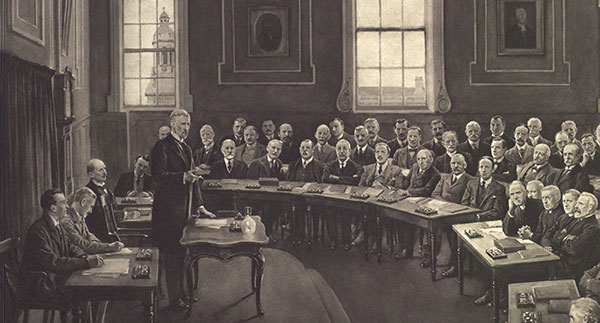100 YEARS AGO: The Irish Convention in Trinity College
Published in Issue 6 (November/December 2017), Volume 25By Joseph E.A. Connell Jr
On 18 September 1914 Home Rule was enacted and simultaneously postponed for the duration of the First World War, which had begun in August. The Ulster question was ‘solved’ in the same way: through the promise of amending legislation, which was left undefined. Unionists were in disarray, wounded by the enactment of Home Rule and by the absence of any definite arrangement for the exclusion of Ulster.
Throughout the war, and especially after the Rising, the issue remained unresolved but at the forefront of Irish politics. After the entry of the United States into the War, Prime Minister Lloyd George faced additional pressure from his new ally to resolve the ‘Irish question’. Three Sinn Féin by-election wins surprised both the Irish Parliamentary Party (IPP) and the British government.
An Irish Convention sat in Trinity College, Dublin, from 25 July 1917 to 5 April 1918 (there were also some sessions in Cork and Belfast). It brought together 101 delegates from different political fields and other interests. From the outset, intentions, reservations and expectations differed considerably. Horace Plunkett was its chairman. Members included mayors and chairmen of public bodies, together with almost every prominent Irishman outside politics, but its weakness was on the political side. It was comprised of Nationalists, Ulster Unionists, Southern Unionists, Labour representatives and the Catholic hierarchy.
IPP MPs came to the conclusion that a conference might be the party’s only hope of salvation; if the chance of a conference were lost, ‘there was nothing ahead but disaster’. They knew that the ‘Irish Question’ would no longer be solved on the floor of parliament. The Catholic hierarchy in the year after the Rising had been split over what kind of change in national leadership the Church ought to support. After indicating on 14 June 1917 that they might decline to send a delegation, the following week they decided in favour of attending. As a first step they pledged themselves to oppose partition.

Above: Horace Plunkett chairing a session of the Irish Convention in Regent House, Trinity College, Dublin. (NLI)
For Ulster Unionists the Irish Convention presented a dilemma. If they boycotted it, Nationalist Redmondites could produce a Home Rule scheme acceptable to England, with Britain insisting on Ulster’s acceptance. A 26-county Irish parliament, coupled with the rise of Sinn Féin, presented a greater danger to the realm than the original Home Rule. Edward Carson pointed out that, since the 1914 Act could not be repealed from the statute book, Ulster representatives would need to ensure that ‘any form of Home Rule which is put into operation shall be the best possible in the interest of Ireland and Great Britain, and free from the defects of the Act of 1914, apart from the obnoxious principle of that Act which is beyond recall’.
Southern Unionists had few options. Their leader, Lord Midleton, had a simple goal—to prevent the 1914 Act from coming into effect, since it contained no provision for Southern Unionist interests. Midleton had two objectives: to avoid partition, which would leave Southern Unionists an isolated minority in a Catholic state, and to secure Ireland’s continued participation in the war, in the hope that the ‘Irish Question’ would be resolved on broad ‘imperial lines’.
Two of the invited parties were prominent by their absence: Sinn Féin declined the allocated five seats on the grounds that the terms of reference of the Convention provided that Ireland must be ‘within the Empire’, which entailed maintaining the supremacy of the British parliament. William O’Brien’s All for Ireland Party (AIFL), which earlier championed the principle of ‘conference plus business’ during the successful Land Conference, refused to take up the two AFIL seats. He predicted that such a large assembly would end in disagreement.
O’Brien’s fears were realised and no positive actions resulted from the Convention. It merely reaffirmed the measure of disagreement between North and South.
Joseph E.A. Connell Jr is the author of Michael Collins: Dublin 1916–22 (Wordwell Books).
















